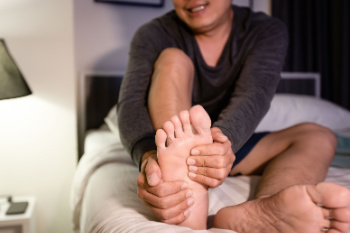
Plantar fasciitis occurs when the thick band of tissue along the bottom of the foot becomes irritated, often causing heel pain. Stretching and strengthening can play an important role in easing the discomfort caused by plantar fasciitis. One helpful stretch involves gently pulling the toes toward the shin while seated, which helps loosen the band of tissue along the sole. Rolling the foot slowly over a firm object, such as a frozen water bottle or massage ball, may also reduce tightness. Calf stretches done against a wall can help relieve pressure on the heel by improving flexibility in the lower leg. In addition to stretching, strengthening the small muscles of the foot with towel scrunches or toe raises may provide better support. These exercises are most effective when done regularly and combined with wearing supportive footwear. Plantar fasciitis can cause extreme pain and discomfort, making it difficult to complete daily tasks. If you have heel pain, it is suggested that you see a podiatrist who can provide effective relief and treatment solutions for plantar fasciitis.
Plantar fasciitis is a common foot condition that is often caused by a strain injury. If you are experiencing heel pain or symptoms of plantar fasciitis, contact Wendy K. Stinson, DPM from New Jersey. Our doctor can provide the care you need to keep you pain-free and on your feet.
What Is Plantar Fasciitis?
Plantar fasciitis is one of the most common causes of heel pain. The plantar fascia is a ligament that connects your heel to the front of your foot. When this ligament becomes inflamed, plantar fasciitis is the result. If you have plantar fasciitis you will have a stabbing pain that usually occurs with your first steps in the morning. As the day progresses and you walk around more, this pain will start to disappear, but it will return after long periods of standing or sitting.
What Causes Plantar Fasciitis?
- Excessive running
- Having high arches in your feet
- Other foot issues such as flat feet
- Pregnancy (due to the sudden weight gain)
- Being on your feet very often
There are some risk factors that may make you more likely to develop plantar fasciitis compared to others. The condition most commonly affects adults between the ages of 40 and 60. It also tends to affect people who are obese because the extra pounds result in extra stress being placed on the plantar fascia.
Prevention
- Take good care of your feet – Wear shoes that have good arch support and heel cushioning.
- Maintain a healthy weight
- If you are a runner, alternate running with other sports that won’t cause heel pain
There are a variety of treatment options available for plantar fasciitis along with the pain that accompanies it. Additionally, physical therapy is a very important component in the treatment process. It is important that you meet with your podiatrist to determine which treatment option is best for you.
If you have any questions, please feel free to contact our office located in Parsippany-Troy Hills, NJ . We offer the newest diagnostic and treatment technologies for all your foot care needs.
